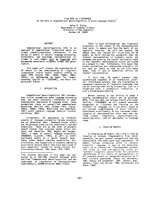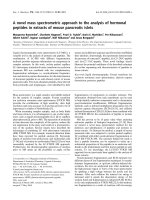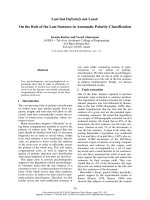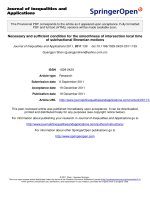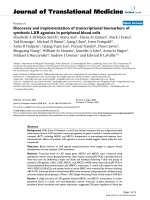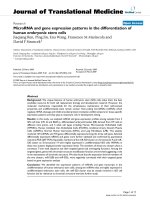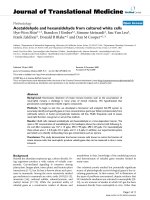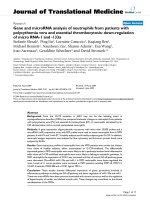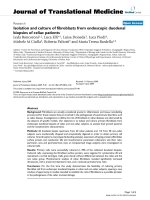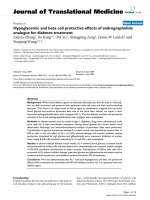báo cáo hóa học: " Discrimination and reliability: equal partners? Understanding the role of discriminative instruments in HRQoL research: can Ferguson''''s Delta help? A response" pptx
Bạn đang xem bản rút gọn của tài liệu. Xem và tải ngay bản đầy đủ của tài liệu tại đây (180.3 KB, 3 trang )
BioMed Central
Page 1 of 3
(page number not for citation purposes)
Health and Quality of Life Outcomes
Open Access
Letter to the Editor
Discrimination and reliability: equal partners? Understanding the
role of discriminative instruments in HRQoL research: can
Ferguson's Delta help? A response
Matthew Hankins
1,2,3
Address:
1
King's College London, Department of Psychology (at Guy's), Institute of Psychiatry, London, UK,
2
Department of Primary Care & Public
Health, Brighton & Sussex Medical School, Brighton, UK and
3
Brighton & Sussex University Hospitals NHS Trust, Royal Sussex County Hospital,
Brighton, UK
Email: Matthew Hankins -
Abstract
A response to Norman GR 'Discrimination and reliability: equal partners?' and Wyrwich KW
'Understanding the role of discriminative instruments in HRQoL research: can Ferguson's Delta
help?'
Response
I would like to thank Norman and Wyrwich for their close
reading of my article [1], and also the editors for inviting
this debate. It is a welcome opportunity to clarify some
points and expand upon others.
I should like to begin by re-stating what coefficient Delta
is and what it is not. Delta is the ratio of observed discrim-
inations made to the maximum possible number; it
ranges from 0 (no discriminations at all are made) to 1
(all possible discriminations are made for a given sample
size and scale range). Discriminations means between-per-
sons differences, which is to say, two people are discrimi-
nated if they score differently on the instrument, and not
discriminated if they score the same. This definition is in
keeping with Kirshner's & Guyatt's [2] definition of a dis-
criminative instrument and Norman's second dictionary
definition. Delta is not a substitute for a reliability coeffi-
cient, since reliability is an index of measurement error,
nor is it a substitute for a validation correlation coeffi-
cient, since this refers to the extent to which the instru-
ment measures the correct construct. In fact, unless an
instrument has been shown to be valid and reliable, there
is little to be gained in assessing its discrimination. What
I have argued, however, is that validity and reliability alone
fail to establish that a discriminative instrument achieves its
purpose of discriminating between individuals.
Hence the examples in the article take validity and relia-
bility as givens; it is assumed that anyone interested in the
discrimination of an instrument has already established
that the instrument is reliable and valid, by whatever
means they find acceptable. The issues of which reliability
coefficient is used, or how exactly validity is established,
are irrelevant. But Norman and Wyrwich make much of
the examples and their (apparent) shortcomings in this
regard. This seems to me to miss the point: the examples
are to illustrate the utility of Delta as an additional index of
an instrument's measurement properties. They are not
complete examples of the development of a HRQoL
instrument (Wyrwich's chief complaint), nor do they sug-
gest that Delta should replace the reliability coefficient
(Norman's main objection). In Example 1 the ICC is not
intended to be a reliability coefficient, as suggested by
both authors, but simply a measure of agreement between
the two scales (Norman states, 'all reliability coefficients
Published: 16 October 2008
Health and Quality of Life Outcomes 2008, 6:83 doi:10.1186/1477-7525-6-83
Received: 6 August 2008
Accepted: 16 October 2008
This article is available from: />© 2008 Hankins; licensee BioMed Central Ltd.
This is an Open Access article distributed under the terms of the Creative Commons Attribution License ( />),
which permits unrestricted use, distribution, and reproduction in any medium, provided the original work is properly cited.
Health and Quality of Life Outcomes 2008, 6:83 />Page 2 of 3
(page number not for citation purposes)
are ICCs', which it true, but not all ICCs are reliability
coefficients).
Norman also suggests that the discrimination of an instru-
ment is already indexed by the reliability coefficient, citing
his own textbook [3]: 'the reliability coefficient reflects the
extent to which a measurement instrument can differenti-
ate among individuals, since the magnitude of the coefficient
is directly related to the variability between subjects", and
later,' reliability is a measure of the extent to which people
differ, expressed as a number between 0 and 1'. This is
simply incorrect. The magnitude of the reliability coeffi-
cient tells us nothing about the variability between sub-
jects, and nothing about the extent to which people differ:
indeed, this is the whole point of my argument. Norman
correctly states that the reliability coefficient reflects the
'proportion of the variance in the observations that relate
to real differences among subjects'. Proportions 'lose' the
quantity of interest, since it appears in both the numerator
and denominator. A reliability coefficient of 0.8, for
example, tells us that 80% of the observed variance is due
to true score variance, but it does not tell us what either
variance is. Two scales might have reliability coefficients
of 0.8, but wildly different variances. Hence, as argued,
reliability coefficients do not serve the purpose of quanti-
fying the degree of discrimination offered by an instru-
ment. They do, however, establish the consistency with
which discriminations are made.
Both Norman and Wyrwich raise the interesting issue of
what constitutes a meaningful discrimination, and
whether Delta is an index of such discriminations. This
happens to be a valid point, but not as argued here. Nor-
man argues it in terms of measurement error (how can we
be sure that discriminations are 'real' if some of them are
due to measurement error?) and Wyrwich from the per-
spective of interpretability (what size of discrimination
should be considered important?). Implicit in this argu-
ment is that a measure of discrimination would be useful
if the discriminations observed were meaningful. Recall
that the value of Delta is derived from ordinal compari-
sons of persons that classify them as either the same or dif-
ferent. Therefore, if a researcher doubts that an instrument
can be trusted to make this most basic distinction, then
the instrument should not be used. It makes no sense to
declare that an instrument has 'acceptable' reliability and
interpretability, but then argue that it cannot be trusted to
rank order people in a meaningful way. This would inval-
idate any statistical treatment of data that failed to take
measurement error into account. It does not constitute an
argument against the use of Delta.
It is possible, however, to incorporate these elements into
the computation of a coefficient of discrimination if
required. As Thurlow [4] pointed out, the only discrimina-
tions worth considering are valid discriminations. Fergu-
son's Delta [5] is computed on the assumption that the
measurement is valid and reliable to the degree that the
instrument produces a valid rank ordering of people
(number of discriminations observed/total number possi-
ble). If this is not the case, then the numerator should be
adjusted to take into account only meaningful differences,
however defined.
For example, if the reliability coefficient suggests that dif-
ferences in the observed score should be greater than 3
points to allow for measurement error, then a 'discrimina-
tion' becomes 'any between-person difference of greater than
3 points'. Similarly, if the minimum important difference
is considered to be 5 points, then a discrimination is
defined as any between-persons difference > = 5 points.
Delta then indexes the degree to which the instrument
makes valid discriminations.
Wyrwich suggests that the results of another study [6], in
which the dichotomous scoring method of the GHQ-12
was found to be less discriminating than the Likert scoring
method, were 'well expected'. This again suggests that an
index of discrimination serves a useful purpose as an
empirical test of assumptions such Wyrwich's: 'Likert
response items (if chosen correctly) are more discriminat-
ing between individuals than dichotomous items'. In fact,
this is not always true: for example, the variant dichoto-
mous scoring method for the GHQ-12 [7] can result in
greater discrimination than the Likert scoring method [8].
I suspect that Norman, Wyrwich and I agree on the funda-
mentals: discriminative HRQoL instruments should be
validated and of sufficient reliability for the task at hand;
they should provide interpretable data; and thus any dis-
criminations made should be 'real'. My argument is that
the degree to which a discriminative instrument actually
discriminates between people should be quantified by a
separate index, Delta. It remains to be seen how these ele-
ments, particularly reliability and discrimination, interact.
In closing I should directly answer the questions posed by
Norman and Wyrwich in the titles of their pieces. Norman
asks 'Discrimination and reliability: Equal partners?' to
which the answer is no; reliability trumps discrimination,
for reasons explained above. Wyrwich asks 'Understand-
ing the Role of Discriminative Instruments in HRQoL
Research: Can Ferguson's Delta Help?' to which the
answer is a definitive yes, subject to the constraints previ-
ously discussed.
Finally, I have a question for them. You are faced with the
choice of two discriminative HRQoL instruments, A and
B. Both are reliable enough for your purposes; they are
also equally valid. In all other respects they meet your
Publish with BioMed Central and every
scientist can read your work free of charge
"BioMed Central will be the most significant development for
disseminating the results of biomedical research in our lifetime."
Sir Paul Nurse, Cancer Research UK
Your research papers will be:
available free of charge to the entire biomedical community
peer reviewed and published immediately upon acceptance
cited in PubMed and archived on PubMed Central
yours — you keep the copyright
Submit your manuscript here:
/>BioMedcentral
Health and Quality of Life Outcomes 2008, 6:83 />Page 3 of 3
(page number not for citation purposes)
requirements equally well. Delta for instrument A is 0.95,
and for instrument B it is 0.30.
Which would you choose?
List of abbreviations
HRQoL: Health related quality of life; GHQ-12: General
health questionnaire (12 item version).
Competing interests
The author declares that they have no competing interests.
Author information
MH is a Senior Research Fellow in the Division of Primary
Care & Public Health, Brighton & Sussex Medical School,
United Kingdom.
References
1. Hankins M: How discriminating are discriminative instru-
ments? Health and Quality of Life Outcomes 2008, 6(1):36.
2. Kirshner B, Guyatt G: A methodological framework for assess-
ing health indices. J Chronic Dis 1985, 38(1):27-36.
3. Streiner D, Norman G: Health Measurement Scales – A practi-
cal guide to their development and use. 3rd revised edition.
Oxford University Press; 2003.
4. Thurlow W: Direct measures of discriminations among indi-
viduals performed by psychological tests. Journal of Psychology
1950, 29:281-314.
5. Ferguson GA: On the theory of test discrimination. Psy-
chometrika 1949, 14:61-68.
6. Hankins M: Questionnaire discrimination: (re)-introducing
coefficient Delta. BMC Medical Research Methodology 2007, 7:19.
7. Goodchild ME, Duncan-Jones P: Chronicity and the general
health questionnaire. British Journal of Psychiatry 1985:55-61.
8. Hankins M: The reliability of the twelve item general health
questionnaire (GHQ-12) under realistic assumptions. BMC
Public Health 2008, 8:355.
